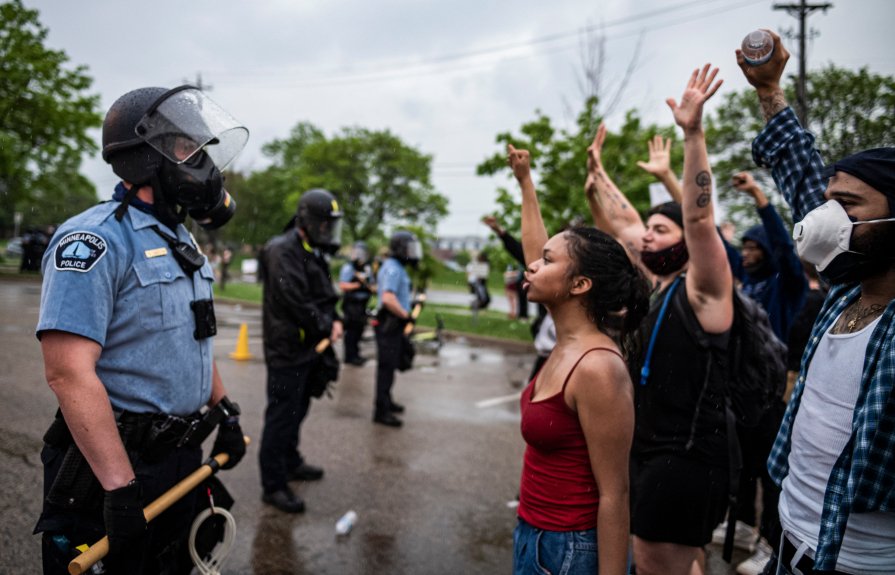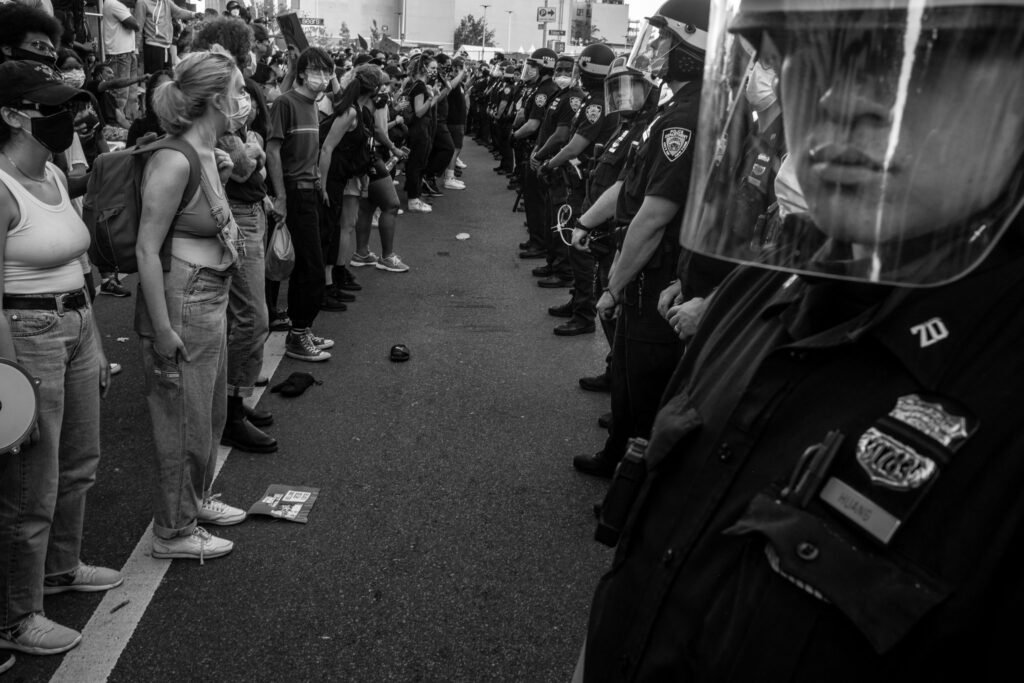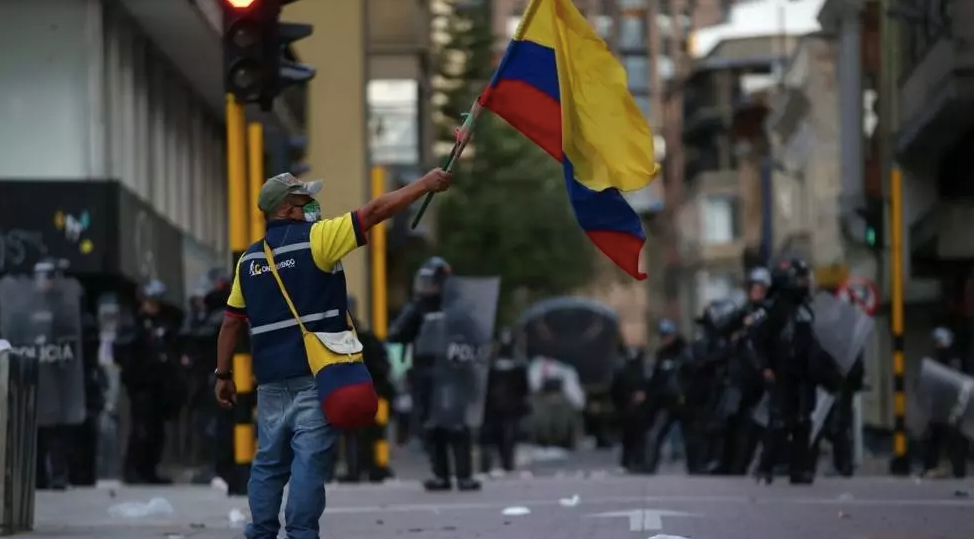El siguiente texto fue escrito por el estudiante Juan David Parra, de grado 11, para su clase de Language Arts & Literature: Socratic Seminar. Se trata de argumentos que apelan a la lógica, la credibilidad y la emoción para encontrar soluciones a la brutalidad policial. Este texto es postulado por la guía Geraldine Cortés.

Por: Juan David Parra
Solutions to Police Brutality in Colombia and the U.S.
It is no secret that this year there were several cases in both Colombia and the United States of America where the police exceeded their duties in an attempt to guarantee the security of the population; particularly noteworthy are the cases of Javier Ordoñez on September 9 and George Floyd in May 2020, respectively. In both situations, police were responsible for the deaths of these people and these events led to violent protests in both countries. Yes, it is true that the police officers in question went beyond the rules under which they can operate, but fighting fire with fire is not the best alternative to curb the growing violence against state institutions. The following should be considered alternatives to solve this problem that increases polarization in both societies:
Mandatory use of body cameras: There is evidence that claims of abuse of authority decrease when police use body-worn cameras (BWC). Stolzenberg (2019) carried out a study within the Miami-Dade Police Department (MDPD) and in her article Eyes on the Street: Police Use of Body-Worn Cameras in Miami-Dade County, she wrote that the number of complaints against police officers decreased by 34%, there were 19% fewer cases of clashes between civilians and police officers, and the number of cases against the institution due to excessive use of force decreased by 74%. Therefore it is possible to say that if there is a law that forces police officers in both Colombia and the United States to wear BWCs all the time, then the recordings from these devices can be admitted as evidence in court cases against the police, and thus help to clarify the truth of the events involving members of this body and improving their public image.
Stop generalizing: How many of you can’t get enough of hearing foreigners say that we Colombians are drug traffickers? This equivalence between our country and drug dealing issues is the result of an increasing phenomenon known as generalization which is formed by a rhetorical figure known as the fallacy of the converse or Affirming the consequence. In this case it would be something like “If a person dies in the riots, it is the fault of the police. One person died in the riots, so the police are to blame.” or even the acronym A.C.A.B. which stands for “all cops are bastards”. The effect of these claims is that not only are the police in general defamed for the actions of a few individuals, but the physical and emotional integrity of many people who strive to protect our society by working in this institution is endangered. Wouldn’t you be frightened to death with the idea that because some Colombians are drug dealers, people abroad would refuse to hire you or allow you to pursue your dreams there? I’m terrified with that idea, so I try and I encourage everyone here to not blame an entire organization for the crimes that a few people committed, but rather blame those specific individuals who killed Mr. George Floyd and Mr. Javier Ordóñez and peacefully communicate this message of unconformity to the Judicial Branch so that they can handle the situation by the book.

Don’t believe everything that appears on social networks or in the media: This type of situation leads to a variety of reactions that divide society between victim sympathizers and those who are in favor of the establishment; and both on social networks and in the media you can see these positions. Everyone saw “The Social Dilemma” right? Do you remember when they said that the social media business had a kind of “model” of us that they could manipulate by using our consciousness against us? Let’s take Ben’s case as an example. He followed on his social networks a guy who believed in a political movement called “Radical Centrism” that promoted abstention from voting in elections. When he watched a video, suddenly more recommended videos started to appear and he lost his objectivity and became a puppet; in the end he ended up in a demonstration of this collective and was arrested by the authoritarian authorities. This relates to the media from which we receive information, because if for example we have a headline such as Muere Dylan Cruz, el joven baleado por la policía durante las protestas en Colombia, and it pops-up in our devices because someone who is in our social circle shared this information, then we stop seeking for the truth, we turn ourselves against the State and end up in manifestations that -as it has happened in this country- end wrong. My invitation with this is to search information from both perspectives so that we don’t become puppets serving some interests without any criteria; read before sharing, considering that fake news can cause polarization.
Know how the current legislation handles these cases: Article 221 of the Colombian Constitution establishes that “The punishable conduct committed by the members of the public force in active service, and in relation to the same service, will confront the martial courts and the military courts…” and in the case of the U.S. Graham v. Connor (1989) ruled that in case of physical assault committed by a police officer against a civilian, in an attempt to bring them to justice, there should be another police officer at the exact same scene with a 20/20 vision accuracy, who witnessed said assault and whose testimony must be considered to initiate a legal prosecution against them. It is possible to see that in both cases there was more than a police officer involved so the correct procedure, given these circumstances, it is subpoenaing police officers in a court of law (martial or ordinary, depending on the legislation) to give their side of the story and so that the legal situation of both parties can be resolved without resorting to citizen violence. (LOGOS)
Compensation for victims’ relatives: If policemen are proven guilty, the right thing to do is for the State to financially compensate the victim or the victim’s family members in the event of the victim’s death. Article 86 of the Colombian Constitution allows any citizen to invoke legal protection under a figure known as Acción de Tutela which is a lawsuit against the State or any of its bodies when a person’s fundamental rights are compromised by an action of this entity. Acts of police brutality endanger the basic rights of human beings so if the victim survives these actions, they should be able to sue the police officers who assaulted them so that, with the help of a judicial body, their rights can be restored; not only in Colombia, but on an international level.

Reference Material:
Constitute Project (2020, May 12). Colombia’s Constitution of 1991 with Amendments through 2015. p. 65. Retrieved September 21, 2020 from https://www.constituteproject.org/constitution/Colombia_2015.pdf?lang=en
Narváez, M. (2019, December 17). Muere Dylan Cruz, el joven baleado por la policía durante las protestas en Colombia. MOR.BO. Retrieved September 18, 2020 from https://www.ismorbo.com/muere-dylan-cruz-el-joven-baleado-por-la-policia-durante-las-protestas-en-colombia/
Stolzenberg, L., D’Alessio, S.J., & Flexon, J.L. (2019). Eyes on the Street: Police Use of Body-Worn Cameras in Miami-Dade County. ISBN-13: 978-1-936651-06-1. Weston Publishing, LLC. Retrieved September 18, 2020 from https://www.prnewswire.com/news-releases/researchers-find-that-body-worn-cameras-decrease-citizen-complaints-against-police-officers-in-miami-dade-county-300772469.html
The Social Dilemma. 2020. [film] Directed by J. Orlowski. Netflix.
United States Department of Justice. Law Enforcement Misconduct. Justice.gov. (2020). Retrieved 22 September 2020, from https://www.justice.gov/crt/law-enforcement-misconduct

